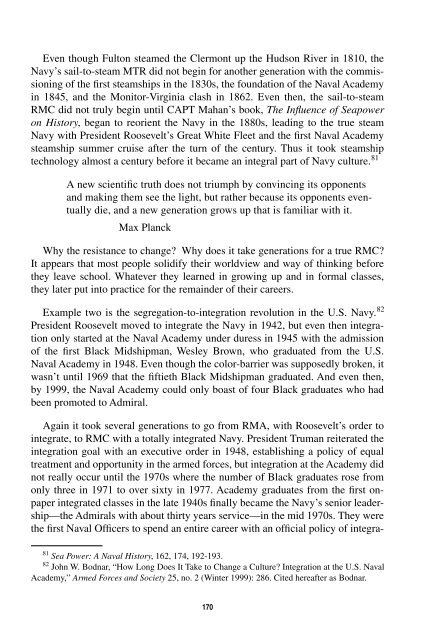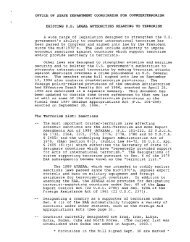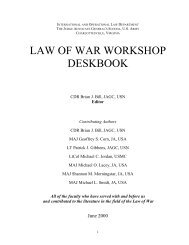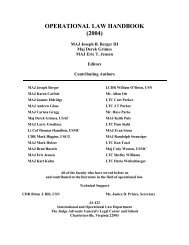Warning Analysis for the Information Age - Higgins Counterterrorism ...
Warning Analysis for the Information Age - Higgins Counterterrorism ...
Warning Analysis for the Information Age - Higgins Counterterrorism ...
Create successful ePaper yourself
Turn your PDF publications into a flip-book with our unique Google optimized e-Paper software.
Even though Fulton steamed <strong>the</strong> Clermont up <strong>the</strong> Hudson River in 1810, <strong>the</strong>Navy’s sail-to-steam MTR did not begin <strong>for</strong> ano<strong>the</strong>r generation with <strong>the</strong> commissioningof <strong>the</strong> first steamships in <strong>the</strong> 1830s, <strong>the</strong> foundation of <strong>the</strong> Naval Academyin 1845, and <strong>the</strong> Monitor-Virginia clash in 1862. Even <strong>the</strong>n, <strong>the</strong> sail-to-steamRMC did not truly begin until CAPT Mahan’s book, The Influence of Seapoweron History, began to reorient <strong>the</strong> Navy in <strong>the</strong> 1880s, leading to <strong>the</strong> true steamNavy with President Roosevelt’s Great White Fleet and <strong>the</strong> first Naval Academysteamship summer cruise after <strong>the</strong> turn of <strong>the</strong> century. Thus it took steamshiptechnology almost a century be<strong>for</strong>e it became an integral part of Navy culture. 81A new scientific truth does not triumph by convincing its opponentsand making <strong>the</strong>m see <strong>the</strong> light, but ra<strong>the</strong>r because its opponents eventuallydie, and a new generation grows up that is familiar with it.Max PlanckWhy <strong>the</strong> resistance to change? Why does it take generations <strong>for</strong> a true RMC?It appears that most people solidify <strong>the</strong>ir worldview and way of thinking be<strong>for</strong>e<strong>the</strong>y leave school. Whatever <strong>the</strong>y learned in growing up and in <strong>for</strong>mal classes,<strong>the</strong>y later put into practice <strong>for</strong> <strong>the</strong> remainder of <strong>the</strong>ir careers.Example two is <strong>the</strong> segregation-to-integration revolution in <strong>the</strong> U.S. Navy. 82President Roosevelt moved to integrate <strong>the</strong> Navy in 1942, but even <strong>the</strong>n integrationonly started at <strong>the</strong> Naval Academy under duress in 1945 with <strong>the</strong> admissionof <strong>the</strong> first Black Midshipman, Wesley Brown, who graduated from <strong>the</strong> U.S.Naval Academy in 1948. Even though <strong>the</strong> color-barrier was supposedly broken, itwasn’t until 1969 that <strong>the</strong> fiftieth Black Midshipman graduated. And even <strong>the</strong>n,by 1999, <strong>the</strong> Naval Academy could only boast of four Black graduates who hadbeen promoted to Admiral.Again it took several generations to go from RMA, with Roosevelt’s order tointegrate, to RMC with a totally integrated Navy. President Truman reiterated <strong>the</strong>integration goal with an executive order in 1948, establishing a policy of equaltreatment and opportunity in <strong>the</strong> armed <strong>for</strong>ces, but integration at <strong>the</strong> Academy didnot really occur until <strong>the</strong> 1970s where <strong>the</strong> number of Black graduates rose fromonly three in 1971 to over sixty in 1977. Academy graduates from <strong>the</strong> first onpaperintegrated classes in <strong>the</strong> late 1940s finally became <strong>the</strong> Navy’s senior leadership—<strong>the</strong>Admirals with about thirty years service—in <strong>the</strong> mid 1970s. They were<strong>the</strong> first Naval Officers to spend an entire career with an official policy of integra-81 Sea Power: A Naval History, 162, 174, 192-193.82 John W. Bodnar, “How Long Does It Take to Change a Culture? Integration at <strong>the</strong> U.S. NavalAcademy,’’ Armed Forces and Society 25, no. 2 (Winter 1999): 286. Cited hereafter as Bodnar.170
















